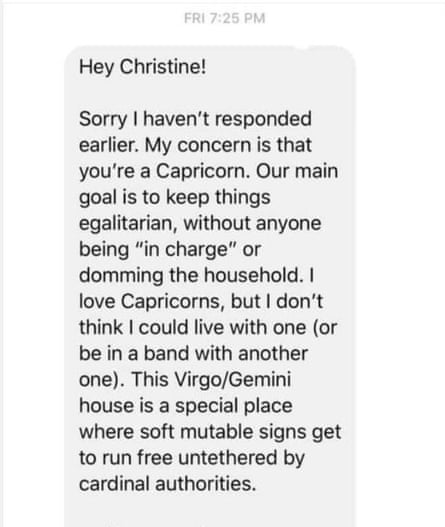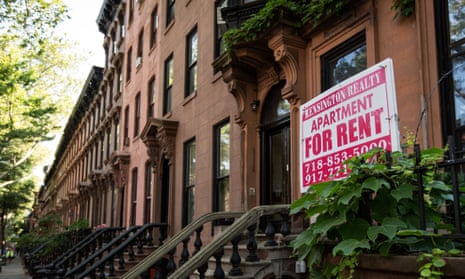Is choosing a roommate based on their astrological sign simply a preference, or illegal discrimination? It may depend on where you live.
This week, a post sharing the response to a housing inquiry went viral when the applicant was turned down for their zodiac sign of Capricorn.
“Our main goal is to keep things egalitarian, without anyone being ‘in charge’ or domming the household,” the original poster said. Capricorns are known for being “know-it-alls”, “unforgiving” and condescending as well as good managers, disciplined and self-controlled, according to online astrology resources. “I love capricorns, but I don’t think I could live with one,” the post said.
People often share preferences for certain astrological signs, swearing to never date another Gemini (as pop star Lizzo did on her most recent album). As interest in astrology grows and apps to look up the signs of potential co-workers, partners and housemates become more mainstream, some have speculated that rejecting someone based on their star sign is a form of discrimination.
This argument is legally tenuous at the federal level, said David Levine, a professor who teaches civil procedure law at the University of California Hastings College of Law.
“In order for this to be legally considered discrimination, you have to fall within a protected category,” he said. “Otherwise, you can choose to create a housing contract for any reason you want.”

The last time he was looking for a place to live, Jesse, a paralegal based in New York City, found a room in his price range on a queer housing group on Facebook. During the interview with his potential housemates, there was some discussion about everyone’s zodiac signs, something Jesse had not paid much attention to in the past.
But later he got a message saying he wasn’t a good fit for the house, and had a suspicion it was because of his sign (Jesse asked the Guardian to refrain from publishing his last name so no one else finds out he’s an Aries).
“I have no way of knowing not being called back was related to my sign, but it did strike me as an odd thing to ask,” he said. “It’s the kind of situation where I think if my sign matters that much to you, maybe we’re better off not living together. Although I suppose that logic applies to other forms of discrimination.”
The US Fair Housing Act of 1968 and the Fair Housing Amendments Act of 1988 prohibit discrimination against people under seven “protected categories” including race or color; religion; national origin; familial status or age, disability or handicap, or sex – none of which addresses zodiac signs explicitly.
The closest protection this may hinge on is religion, which is difficult to prove. To discriminate against religions without doing so openly, companies can make buildings less amenable to certain groups. An Orthodox Jewish couple may avoid housing that does not have a Sabbath elevator or some customers may avoid buildings with bad feng shui based on their beliefs, he said. But making a home unwelcoming to certain signs probably doesn’t fall under federal protection, he said.
“This seems like a choice, not discrimination,” he said. “Discrimination is a loaded word, but we discriminate all the time, whether it’s buying a generic brand of corn instead of the brand name. We are constantly making choices, and often this is a perfectly legal choice.”
Many states offer additional protections under housing law, barring people from discrimination due to factors including medical condition, genetic information, marital status or sexual orientation. Under California’s Unruh Civil Rights Act, which prohibits “all arbitrary and intentional discrimination by a business establishment”, denying someone a place to live because they are a Capricorn would be illegal, said Caroline Peattie, the executive director at Fair Housing Advocates of Northern California.
“This is not a legitimate basis for turning someone down,” she said. “It has nothing to do with their ability to pay rent or be a good tenant.”
Of course, those who believe in astrology are arguing just that – some signs are better tenants or roommates than others. These rules can vary based on kind of home and whether the living space is shared, she said. One exception is gender: people are legally allowed to say they prefer to cohabitate with someone of a certain gender over another. But in Peattie’s view, a zodiac sign is not a legally legitimate reason to turn someone away, and proving otherwise would be difficult in court.
“Clearly the person making the determination says that they think all Capricorns act a certain way,” Peattie, who is a Scorpio, said. “But good luck finding an attorney for that.”
People in the astrology world have spoken out against uses of astrology to turn people down for jobs and homes. Annabel Gat, an astrologer and writer at Vice’s Broadly implored people to “stop using astrology for evil”. Banu Guler, the chief executive officer of Co–Star, an astrology app that just raised over $5m in venture capital funding, said astrology should not be used to discriminate.
“We’re all born under the same sky, and our charts are populated by the same planets,” Guler said. “Astrology is a tool to help people find their way in the world, not to prevent others from participating in it.”
